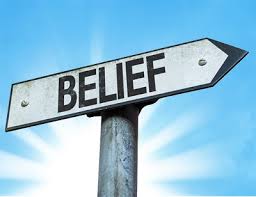I have been at both ends of the spectrum; well, maybe not quite the ends, but as far away from each other that it doesn’t matter. By this I mean I have been a believer and then not-quite-a-believer. I was raised a Christian, in the Methodist church, until my mother encouraged us to convert to Catholicism, which is a whole other story. I was raised with the doctrine of “God knows best” and if trials befall you, then it is part of God’s Master Plan which you didn’t question, but simply believed. You believed that if God brought you to it, He would see you through it. My mother was a devout Christian, who didn’t attend church all that often, but firmly believed that she was in God’s hands. Even as a young child I had questions about this God who seemed to have a sadistic tendency to make His children suffer – although I wouldn’t have put it this way back then. I also pondered why, if God created us in His image, and if He was perfect, then why did we come to this world as sinners and have to be saved, by His only son dying for our sins? Very little of what the Church teaches makes sense, which is why believers are called that: they believe in spite of, not because of, any evidence that the Church’s doctrine (whichever denomination or version of Christianity you espouse). My mother’s life, filled with tragedy and misfortune, was a good example of the kind of suffering God allegedly bestowed on His favoured children, by visiting on them out-of-the-ordinary misfortunes, and helping them get through. My mother used to say, only half-jokingly, that there was a special place reserved for her in Heaven.
I finally stopped going to church, which if you are a Catholic is considered a mortal sin, when my disabled brother took his own life at 28 years of age. I don’t remember openly questioning why God would visit so much suffering on a young life, but there must have been a sense of being unable to believe in such a God.
Thus began the leaning towards the other end of the spectrum. When I met my future husband, who had been raised a Catholic, attended Catholic school and still attended mass every Sunday, I was back at church with his encouragement. When our children were born we baptised them and they went to church with us. We chose to educate them in Catholic primary and secondary schools.
Over the years leading up to me no longer going to mass, church to me was more about community and a sense of belonging, rather than a place of worship. I tried to buy into the prayers and rituals but felt very much outside of it, an onlooker. Eventually, I went only sporadically, and then I stopped altogether. At this point, I was not a non-believer and wouldn’t have called myself an atheist, but I completely disengaged with formal religion. I felt or knew that there was a God or higher spirit or energy, but couldn’t name it and didn’t try.
I drifted, trying out various self-help techniques and spiritual pathways such as EFT (Emotional Freedom Techniques, commonly known as ‘Tapping’), Abraham (Abraham-Hicks) and ciHThe Sedona Method. I also did an online course in energy healing which opened my mind to the ability of minds to connect when bodies are not together. Each of these methods was useful and through my diligent practice, I felt I progressed incrementally in my spiritual journey, as a seeker of the truth.
Around this time, I started to sense Jesus’ presence. I cannot say why or how but I knew he was there and I started to communicate with him even though I only slightly believed it was real. I thought I was imagining it and questioned why he would come to ‘little old me’. But he was there nonetheless and I felt he was trying to tell me something. I came to realise that I had thrown out the baby with the bathwater in respect to my religious beliefs. When I disengaged with formal religion I had given away Jesus because the Jesus of religion wasn’t someone I related to at all. And I had simply given away anything to do with religion.
About two years after I first sensed Jesus’ presence I was introduced to A Course in Miracles. Jesus, the author of the Course, makes no bones about where the Bible got it wrong, what his human life was about and debunks or reframes many other Christian beliefs. These I will write about in other posts, and suffice it to say the Course has not only answered all those questions I had about God, but it has given me a map, a means by which I can achieve salvation.
